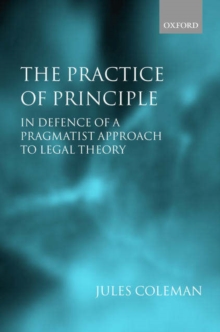
Change and Continuity : Statute, Equity, and Federalism Hardback
by William (Justice, High Court of Australia, Justice, High Court of Australia) Gummow
Part of the Clarendon Law Lectures series
Hardback
Description
This volume is based closely on the lectures delivered by The Hon.
Justice W. M. C. Gummow at Oxford University in 1999 as part of the Clarendon law lectures series, sponsored by Oxford University Press.
These lectures take up themes of continuity and change in the law, particularly as they appear in the great common law jurisdictions.
The tension between continuity and change appears from a consideration of the interaction between statute and the case law which interprets it, of the interaction between equity and statute, and finally of the operation of that constitutional arrangement known as federalism. Statute speaks to the state of affairs at the time of enactment.
That state of affairs is dynamic; the statute, at least in form, is static.
Conversely, in its development the common law may be informed by changes effected by statute.
The extent to which the common law may or should respond in this way is a matter of controversy.
Further, the accommodation of an apparently rigid statutory structure to individual circumstances has, for centuries, been assisted by the leavening effect of equitable doctrines and remedies. Finally, in federal systems with a division of governmental power and authority by a written supreme law, tensions between continuity, perceived in terms of original intent, and changed circumstances which were unforeseen, may become acute.
Is Britain in the process of becoming a federal state or, indeed, a component of a European federal state? In all these situations, the doctrines developed by the courts assist the passage of society from the past, through the present and into the future.
This invites an inquiry, considered in these lectures, as to the requirements of legal scholarship in a court of ultimate appeal in a common law system.
Information
-
Out of stock
- Format:Hardback
- Pages:142 pages
- Publisher:Oxford University Press
- Publication Date:19/08/1999
- Category:
- ISBN:9780198298236
Information
-
Out of stock
- Format:Hardback
- Pages:142 pages
- Publisher:Oxford University Press
- Publication Date:19/08/1999
- Category:
- ISBN:9780198298236










